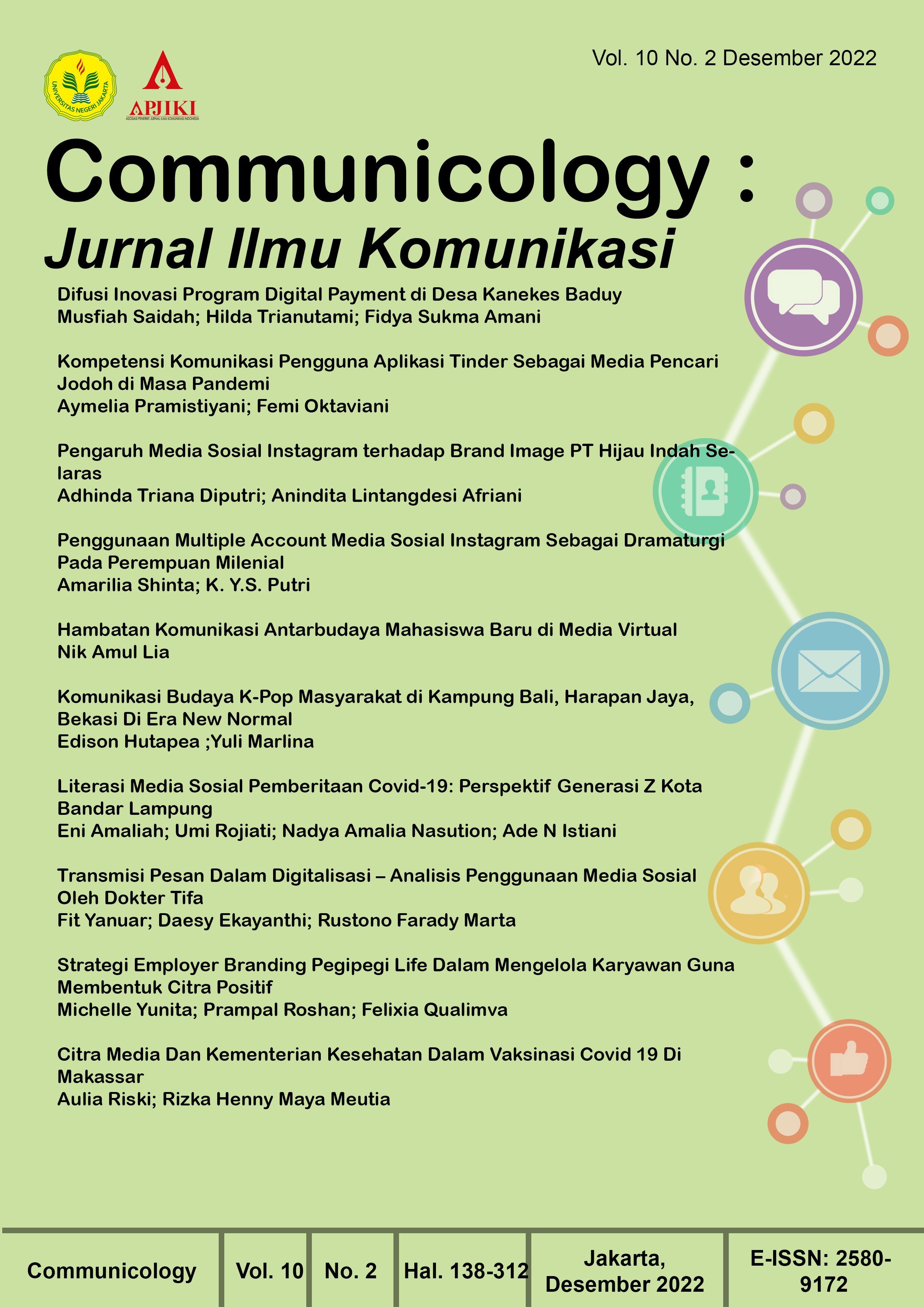Literasi Media Sosial Pemberitaan Covid-19: Perspektif Generasi Z Kota Bandar Lampung
DOI:
https://doi.org/10.21009/COMMUNICOLOGY.030.07Keywords:
Literasi Media, Perspektif Gen-Z, Sense Extention TheoryAbstract
ABSTRACT
Media literacy is an ability that not only involves the ability to use ICT (Information, Communication and Technology), but also the ability to socialize and have attitudes, think critically and creatively as digital competencies. This study aims to find out whether social media literacy about covid 19 news in Bandar Lampung city can influence the perception of generation Z people so that there is a change in attitude. The research method used is a descriptive qualitative method with observation and dissemination of questionnaires. The data that has been collected is calculated in the form of a percentage which is intended to find out the status of something that is presented and presented in the form of a percentage and then interpreted into qualitative sentences. The results of this study show that media literacy about Covid-19 news has a positive effect on public perceptions in forming attitudes, this result is supported because Generation Z of Bandar Lampung City has technological capabilities and is digitally proficient in social media. .
Keywords: Gen-Z Perspective; Media Literacy; Sense Extension Theory
ABSTRAK
Literasi media merupakan kemampuan yang bukan hanya melibatkan kecakapan menggunakan TIK (Teknologi, Informasi dan Komunikasi), melainkan juga kemampuan memiliki sikap dan bersosialisasi, kritis dalam berpikir dan sebagai kompetensi digital dapat kreatif. Penelitian ini bertujuan untuk mengetahui apakah literasi media sosial tentang pemberitaan Covid 19 di kota Bandar Lampung mampu mempengaruhi persepsi masyarakat generasi Z sehingga terjadinya perubahan sikap. Metode penelitian yang digunakan adalah metode kualitatif deskriptif dengan observasi dan penyebaran angket. Data yang telah terkumpul disajikan dengan bentuk presentase bertujuan untuk mengetahui status yang dipresentasekan dan disajikan berwujud presentase kemudian ditafsirkan menjadi kalimat yang bersifat kualitatif. Hasil penelitian ini menunjukan bahwa Literasi media tentang pemberitaan Covid 19 berpengaruh positif terhadap persepsi masyarakat dalam pembentukan sikap, hasil ini di dukung karena Generasi Z Kota Bandar Lampung memiliki kemampuan teknologi dan cakap digital dalam media sosial.
Kata Kunci: Literasi Media; Perspektif Gen-Z; Sense Extention Theory
References
Gumilar, G. (2017). Literasi media: Cerdas menggunakan media sosial dalam menanggulangi berita palsu (hoax) oleh siswa SMA. Jurnal Pengabdian Kepada Masyarakat, 1(1).
Harjono, H. S. (2018). Literasi Digital: Prospek dan Implikasinya dalam Pembelajaran Bahasa. Jurnal Pendidikan Bahasa dan Sastra. 8(1). 1-7.
Hasugian, J. (2009). Dasar-dasar ilmu perpustakaan dan informasi. USUpress.
Kendal, E. (2021). Public health crises in popular media: how viral outbreak films affect the public’s health literacy. Medical Humanities, 47(1), 11-19.
Kusumalestari, R. R., Permatasari, A. N., Anjani, M., & Nadifah, N. N. (2021). Gen Z's Reception of Covid-19 Information on Digital Media. Mediator: Jurnal Komunikasi, 14(2), 157-167.
Liliweri, Alo. 2008. Dasar-dasar Komunikasi Kesehatan. Jakarta : Pustaka Pelajar
Liu, H., Liu, W., Yoganathan, V., & Osburg, V. S. (2021). COVID-19 information overload and generation Z's social media discontinuance intention during the pandemic lockdown. Technological Forecasting and Social Change, 166, 120600.
Nasution, N. A., & Satria, F. (2021). The Influence of COVID-19 News for Religious Activities in Lampung using Apriori Algorithm. JTKSI (Jurnal Teknologi Komputer dan Sistem Informasi)
Notoatmodjo, Soekidjo, 2003, Pengembangan Sumber Daya Manusia, Jakarta: PT. Rineka Cipta.
Nurhaida, I., Aryanti, N. Y., Windah, A., & Purnamayanti, A. (2021). Literasi Informasi Digital: Tantangan Bagi Para Santri Dalam Menjalankan Peran Sebagai Global Citizen (Studi Kasus Pada Pondok Pesantren Darussa” Adah Bandar Lampung). KOMUNIKA, 4(2), 203-213.
Permatasari, A. N., Kusumalestari, R. R., Nadifah, N. N., & Anjali, M. (2022, April). How Geneneration Z Trust in Sources of Information Related to Covid-19. In 4th Social and Humanities Research Symposium (SoRes 2021) (pp. 4-6). Atlantis Press.
Prensky, M. (2001). Digital natives, digital immigrants part 2: Do they really think differently?. On the horizon.
Ruch, F. L. 2010, Psychology and Life, 7 Edt. Scott. Foresman and Company. Atlanta.
Saputra, M., Siddiq, A., & Huda, I. (2020). Social Media and Digital Citizenship: The Urgency of Digital Literacy in the Middle of a Disrupted Society Era. International Journal of Emerging Technologies in Learning, 15(7).
Sarlito W. Sarwono dan Eko A.Meinarno, Psikologi Sosial, (Jakarta: Salemba Empat, 2012)
Sulthan, M., & Istiyanto, S. B. (2019). Model literasi media sosial bagi mahasiswa. Jurnal Aspikom, 3(6), 1076-1092.
Sutrisna I,P,G .(2020). Gerakan Literasi Digital pada masa Pandemi Covid-19. Stilistika: Jurnal Pendidikan Bahasa dan Seni 8 (2), 269-283.
Suwana, F., Pramiyanti, A., Mayangsari, I., Nuraeni, R., & Firdaus, Y. (2020). Digital Media Use of Gen Z During COVID-19 Pandemic. Jurnal Sosioteknologi, 19(3), 327-340.
Khatik, S. K., Joshi, R., & Adwani, V. K. INFERRING THE ROLE OF SOCIAL MEDIA ON GEN Z’S INVESTMENTS DECISIONS.
Kosasih, E., Raharusun, A. S., Dalimunthe, R. P., & Kodir, A. A. (2020). Literasi media sosial dalam pemasyarakatan moderasi beragama dalam situasi pandemi Covid-19. Digital Library UIN Sunan Gunung Djati Bandung.
https://apjii.or.id/content/read/39/342/Hasil-Survei-Penetrasi-dan-Perilaku-Pengguna-Internet-Indonesia-2017
Downloads
Published
How to Cite
Issue
Section
License
Authors who publish with this Journal agree to the following terms:
- Author retain copyright and grant the journal right of first publication with the work simultaneously licensed under a creative commons attribution licensethat allow others to share the work within an acknowledgement of the work’s authorship and initial publication of this journal.
- Authors are able to enter into separate, additional contractual arrangementfor the non-exclusive distribution of the journal’s published version of the work (e.g. acknowledgement of its initial publication in this journal).
- Authors are permitted and encouraged to post their work online(e.g. in institutional repositories or on their websites) prior to and during the submission process, as it can lead to productive exchanges, as well as earlier and greater citation of published works.
Users/public use of this website will be licensed to CC BY





